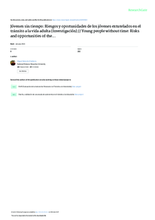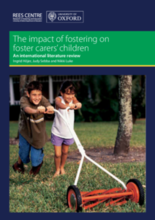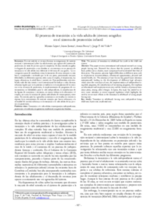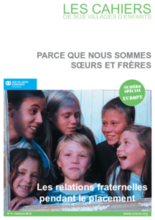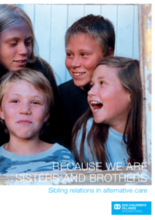Displaying 131 - 140 of 145
La presente investigación trata de los jóvenes sin tiempo y cómo trabajar, con ellos y ellas, en un tránsito inclusivo a la vida adulta, especialmente jóvenes que han pasado una parte importante de sus vidas en recursos residenciales del sistema de protección y que cuando son mayores de edad deben dejarlos para salir a la vida adulta, en un tránsito cargado de complejidades.
In this chapter of Global Perspectives, Jorge F. del Valle and Amaia Bravo discuss the history and state of residential child care in Spain including the transitions that occurred in the 1980s and 1990s. They also discuss types of residential care programs and qualifications of residential care staff. Del Valle and Bravo review recent literature in the area and discuss current challenges in Spanish residential care.
Meant to highlight the maxim that every child deserves the best that we all have to give; this book provides a review of the progress made since The UN Convention on the Rights of the Child. It contains reports from 21 countries on the status of the rights of the child. The countries are: Australia, Canada, Croatia, Denmark, France, Germany, Greece, India, Iran, Japan, Portugal, Romania, Scotland, Serbia, Solomon Islands, Spain, the Netherlands, the UK, the USA, Uzbekistan and Venezuela. There are no reports from Africa.
Work is important for promoting social inclusion, especially for marginalised or economically vulnerable populations. There is also evidence that work is associated with stability and social integration for young people who have left care.
This study investigates the specific training needs of the biological family during the transition phase of the reunification process in which the child prepares to return home.
This literature review by the Rees Centre for Research in Fostering and Education at the University of Oxford was undertaken to identify the ways in which carers’ children might be more effectively prepared and supported when their families are fostering.
En este artículo se revisan diversas investigaciones de carácter nacional de España e internacional sobre los adolescentes que egresan del sistema de protección.
The article reviews the historical development of out-of-home care in Italy and Spain and compares foster family and residential care, as well as the main research contributions to these topics in both countries.
Les enfants placés ont souvent des frères et sœurs. Malgré l’importance du lien fraternel et des décisions le concernant, les recherches européennes sur les relations fraternelles sont rares et plus encore celles sur les fratries placées. Dans la plupart des pays, les données officielles disponibles renseignent sur le nombre, le sexe et l’âge des frères et sœurs dans les familles et leur statut social, mais elles ne disent rien sur les autres caractéristiques des relations fraternelles et de la situation familiale.
This publication by SOS Children’s Villages International brings together research findings, learning and policy recommendations about sibling relations in alternative care gathered from five different SOS Children’s Villages associations (Germany, Austria, France, Italy, and Spain).

